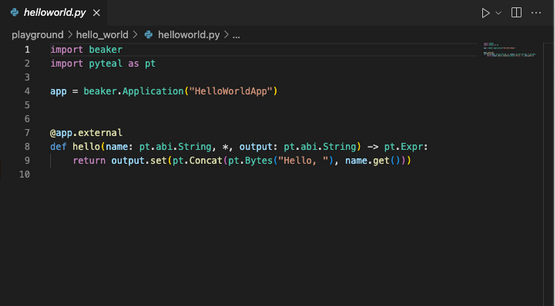Blockchain technology has revolutionised various industries, including finance, supply chain, and gaming. Python developers looking to leverage the potential of blockchain technology can benefit greatly from Algorand. With its robust infrastructure, scalability, and developer-friendly features, Algorand offers an excellent platform for creating decentralised applications (dApps) and smart contracts. In this article, we will explore the reasons why Python developers should consider using the Algorand blockchain and provide insights into its tech and setting up an Algorand project with Algokit.
Algorand: A Brief Overview
Algorand, founded by Turing Award winner Silvio Micali, is a secure, scalable, and decentralised blockchain platform. It employs a pure proof-of-stake (PoS) consensus mechanism, ensuring decentralisation, fast transaction confirmation, and energy efficiency. Python developers can easily interact with the Algorand blockchain using the Algorand SDK, which provides comprehensive tools, libraries, and APIs. The tech stack primarily comprises:
Algorand Standard Asset (ASA): ASA allows developers to create and manage their own digital assets on the Algorand blockchain. It supports features like atomic transfers, flexible supply control, and multi-signature permissions.
“With Algorand Standard Assets you can represent stablecoins, loyalty points, system credits, and in-game points, just to name a few examples. You can also represent single, unique assets like a deed for a house, collectable items, unique parts on a supply chain, etc.”
https://developer.algorand.org/docs/get-details/asa/
Algorand supports the Algorand Smart Contracts (ASC1) model, which leverages familiar programming languages like Python, JavaScript, and Java for smart contract development. This enables Python developers to seamlessly transition to building decentralised applications on Algorand.
Setting up Algokit
https://developer.algorand.org/docs/get-started/algokit/
1. Ensure Python is installed:
Make sure you have Python installed on your machine. You can download it from the official Python website:
https://www.python.org/downloads/
Prerequisites for Algokit include:
- Python 3.10 or higher
- PipX
- Git
- Docker
- VSCode
2. Install Algokit:
Open your terminal or command prompt and run the following command to install Algokit using pipx, Python's package installer:
pipx install algokit
```
3. Start LocalNet:
Algorand uses Docker to run a local network for the dApp to run on. Of course, Docker needs to be installed on your machine first.
algokit localnet start
```
4. Create an AlgoKit project:
Simply one line of code starts you off with a template for an AlgoKit project. For your first demo, just say yes to everything or read more details on AlgoKit templates.
https://github.com/algorandfoundation/algokit-cli/blob/main/docs/features/init.md
```
algokit init
```
Creating a wallet with MyAlgo
MyAlgo is a user-friendly Algorand wallet provider that simplifies the process of creating and managing wallets. Here are the steps to create a wallet using MyAlgo:
1. Visit the MyAlgo website:
Go to the MyAlgo website using your preferred web browser.
2. Create a new wallet:
Click on the "Create Wallet" button on the homepage.
3. Set a strong password:
Enter a secure password for your wallet. Ensure it meets the specified requirements to enhance security.
4. That’s it. You're ready to connect your wallet with Algorand.

Why I like using Algorand for dApps
On numerous occasions I have started developing smart contracts with Solidity, but then I go back to focussing on AI related projects. Solidity and other custom made programming languages for blockchain, often feel like a waste of time; as I cannot find a practical use for these tool sets in my day-to-day life.
With Algorand, I can develop a dApp using Python and then go back to developing AI with the sense that I am developing the same skillset. Sure this is subjective to my current work situation, but my day job relates to databases and cyber security, so focusing on one programming language, such as Python, is more convenient than learning a bunch of frameworks I’ll use once a year.
Sure I have learned a dozen different programming languages, and I can always learn a new programming language, but focusing on Python just makes my life easier and more efficient. I can also use Python to deploy smart contracts on Ethereum, plus the interpolation of Algorand means that I can use multiple different blockchains with one Algorand dApp.
Blockchains come and go, but Python is here to stay. Thus I will be using Algorand for future blockchain projects.
